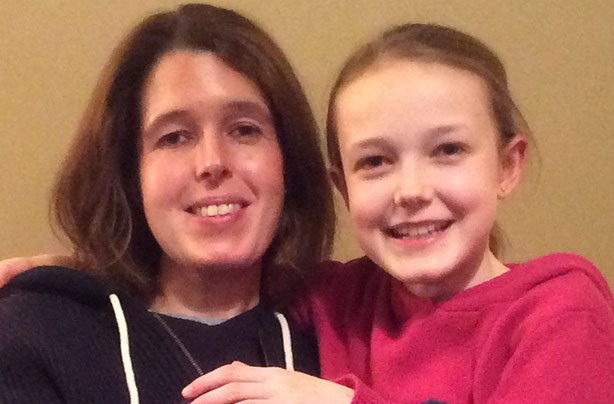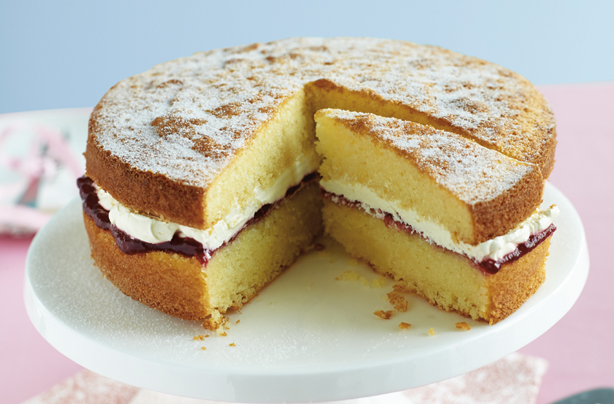'She really misses Smarties and Walkers Crisps' Nine things the mum of a coeliac child wants you to know
'Trick or treat at Halloween is often hard'

The words 'gluten-free' are regular occurrences on menus and supermarket shelves these days - but for some, living without gluten is a necessity, not a lifestyle choice.
Coeliac disease affects at least 1 in 100 people in the UK and in Europe, and can occur in people of any age. Catriona Johnston received her diagnosis at the age of eight, and from that moment on her parents faced the challenge of keeping their daughter healthy and happy through birthday parties, holidays, visits to restaurants and more.
The disease is not a food allergy or an intolerance; it's an autoimmmune disease, and even the smallest crumb can cause sufferers serious pain and damage.
Here, Catriona's mum Freja opens up about the struggles parents of a coeliac child face on a daily basis, and what she wishes other people knew about her daughter's condition...

Diagnosis isn't easy...
According to Coeliac UK, the average length of time taken for someone to be diagnosed with the disease from the onset of symptoms is 13 years - and only 24% of those who actually have the condition are clinically diagnosed.
For Catriona, it didn't take quite so long, but her parents still spent several years concerned about her declining health. 'By the time she was four, she was small compared to her friends and had dropped to the very bottom of the height percentile chart,' Freja recalls. 'By the time she was six, she looked pale and her hair was very thin. Worryingly, she was often sick for no obvious reason.'
Initially, Catriona was suspected to have mild allergies, and prescribed antihistamines, which made her feel even more unwell. 'The possibility of coeliac disease wasn't on the radar of our local GP surgery and multiple visits, over a period of time, didn't produce any real outcome,' Freja adds.
Parenting advice, hot topics, best buys and family finance tips delivered straight to your inbox.
...but it can come as a relief
Although there is no cure for coeliac disease, Freja says she felt 'relieved to finally know what was wrong with Catriona, and that it could be treated without the need for medication.'
'We knew very little about coeliac disease and it never crossed our minds that Catriona might have it. We felt something was wrong but, initially at least, were seen as "worrying over nothing" and there was pushback that we just needed to accept she was a small child.'
However, the family's joy at finally having an answer to the problems that had been plaguing Catriona were tinged with sadness, as she had been diagnosed with a lifelong condition that would require her to follow a very restrictive diet.
Big changes have to be made
Following Catriona's diagnosis, the family made the decision to remove gluten from their home completely. 'This means Catriona can eat anything in the cupboards and removes the risk of cross contamination.'
'We've become very used to checking the ingredient listing of everything we buy – including the sometimes well hidden 'may contain' information. Catriona can't even drink certain diluted juices, and she really misses Smarties and Walkers crisps.
'She has packed lunch every day, but she usually has rice cakes with slices of cheese, as she finds gluten-free bread dry when it is not toasted. She'll have this alongside yoghurt, chopped vegetables, popcorn and fruit snack packs.'
Special occasions are tough
'We have to be a lot more careful about eating out,' Freja admits. 'Since Catriona's diagnosis we have only booked self-catering holidays, as this allows us to ensure that her food is safe when we are abroad (and don't speak the local language).'
'Even a very small amount of gluten will cause an autoimmune response and damage Catriona's body. As a result, we have to be very vigilant. Catriona has a gluten-free birthday cake and we have to make sure that the gravy at Christmas doesn't contain flour. Trick or treating at Halloween is often hard.'
'She is, however, very good at baking gluten-free cakes and biscuits and often bakes cakes for all of us!'

Catriona has developed a talent for baking recipes without gluten, such as this gluten-free Victoria sponge
And it can impact on their confidence
Freja says that Catriona's confidence dipped 'hugely' when she was first diagnosed as a coeliac.
'Food is a very social thing and Catriona became used to being unable to join in with her friends,' she explains. 'We always offer to send Catriona with her own food when she goes to parties or on playdates. If Catriona's friends are providing her food, they often buy a gluten-free ready meal for her, like a rice mac and cheese.'
However, she adds that on the whole, Catriona has been 'really lucky' with the help she's received from others: 'She has some friends whose parents are confident to cook for her and others who make sure they buy her chocolate buttons whenever she goes round.'
There are a lot of misconceptions
'Coeliac disease is a serious autoimmune condition and is formally diagnosed though testing blood levels, gene testing and sometimes a biopsy – it is not a "gluten-free fad" and is not something Catriona will ever grow out of,' Freja explains. 'There are many misconceptions as to what "gluten-free" actually means. For example, friends recently went to a restaurant claiming to serve gluten-free food; shortly afterwards their daughter (who has coeliac disease) became ill and it turned out the restaurant assumed "wheat-free" and "gluten-free" were the same – they're not!'
The gluten-free trend is both a blessing and a curse
In the three years since Catriona received her diagnosis, Freja has noticed that the free-from market has expanded 'massively'. 'There's no doubt the "living gluten-free" trend has driven this growth,' she says. 'This means there is greater choice for Catriona and it has made eating out easier - several restaurant chains have Coeliac UK's gluten-free accreditation.' These include Chiquito, Carluccio's, Domino's Pizza, Frankie & Benny's and Pizza Express, amongst others.
'Sometimes, however, Catriona finds it hard that people can be gluten-free and then choose to eat gluten on a special occasion or think that eating gluten once in a while doesn't matter. Her gluten-free is not a choice – she cannot eat gluten when there are no gluten-free options and she can't ever eat from a buffet because of the risk of cross contamination.'
Health complications can be serious
Damage to the gut lining occurs when someone with coeliac disease eats gluten, and if a gluten-free diet is not followed, the condition can lead to nutritional deficiencies and other complications such as osteoporosis, cancer of the small bowel and unexplained infertility problems.
If someone with coeliac disease accidentally eats gluten, they are likely to be unwell within a few hours. Symptoms can be varied but include severe diarrhoea and vomiting and can last several days.
However, even if you're very careful with your diet, as Catriona is, complications can occur. 'When you have one autoimmune condition, the risks of developing other autoimmune conditions are increased. This worries us a little,' Freja says. 'We also get anxious, as Catriona grows up and begins, for example, to go on school residential trips, that her needs are recognised and safely catered for.'
We're hoping research can help
'There is a lot of research into treating coeliac disease at the moment. We very much hope that Catriona may benefit from this in the future,' she concludes. 'Catriona has had to learn to be assertive about her 'type' of gluten-free. This is not always easy and we are very proud of Catriona that she manages it so well.'
If you think you or your child may be suffering from coeliac disease, it's important to get the help of a professional.
'The first step is to discuss symptoms with a GP who can take a simple blood test to check for antibodies. Antibodies are produced by the body in response to eating gluten,' Coeliac UK advises. 'It is essential to continue to eat a diet that contains gluten before and during the testing process, otherwise the test won't work.'
If blood tests prove positive, you'll be referred to a specialist, who can check for damage in the gut lining, and, if a formal diagnosis is received, advise you on the best way to manage your symptoms to lead a healthy, gluten-free lifestyle.
Trusted, informative, and empathetic – GoodToKnow is the ultimate online destination for parents. At GoodtoKnow, our mission is 'simple': we're trying to make sense of parenthood. On the site, you'll find everything you need for a happy, healthy family life. Our huge archive of content includes more than 18,000 articles and 1,500 how-to videos. These include expert-backed advice features on parenting, dealing with relationship changes after having a baby, self-care for mums and managing your family finances. We also feature tried-and-tested product reviews and buying recommendations for every stage of family life - from prams and Moses baskets to birthday gifts and top toys.